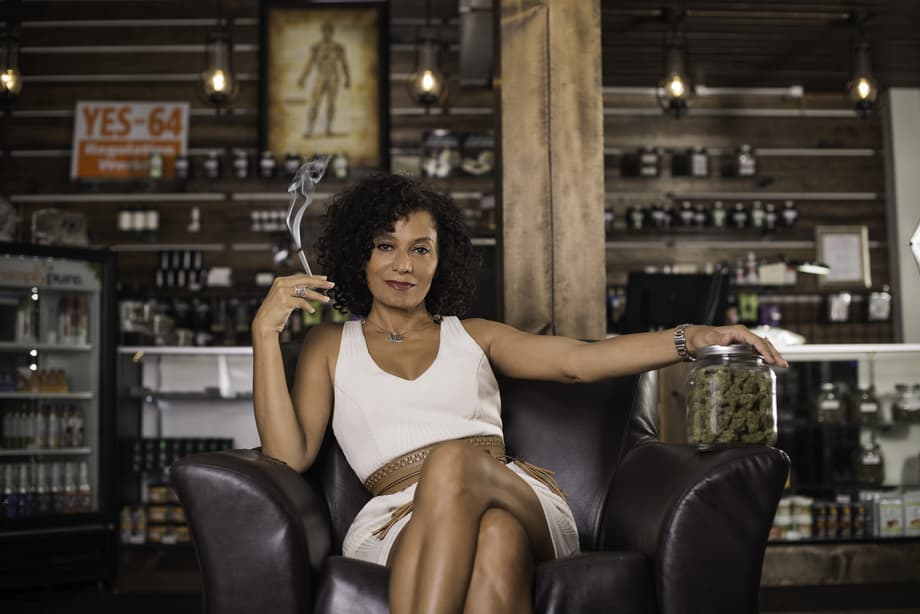Getting into the cannabis business was personal for Simply Pure owners Wanda James and Scott Durrah.
Wanda’s brother Rick James, who now works in Simply Pure’s grow facility, served six years of a 10-year sentence for possession of 4 ounces of cannabis — four years of which he spent picking cotton in a maximum security prison.
“To me that is slave labor,” Wanda James said. “When I found out that a member of my family was a slave for ten years, we had to make a difference.”
James worked in the Amendment 64 campaign that legalized cannabis in Colorado and has worked with the NAACP and the Colorado office of Drug Policy Alliance to fight for decriminalization of cannabis nationwide.
But for James, making a difference also meant putting her face — a black face — on the cannabis industry to propel political, economic, and social justice issues to the forefront of the legalization discussion. James couldn’t be more perfect for the role. A former Navy lieutenant, James is well-connected politically, having served on former President Barack Obama’s National Finance Committee and as campaign manager for Colorado’s now-Governor Jared Polis in his successful run for US Congress.
In 2009, James and Durrah opened Apothecary of Colorado, a 10,000-square-foot cultivation facility and dispensary that served about 500 medical marijuana patients. In 2010, they sold the business to focus on making a line of THC-infused edible products.
James and Durrah, a well-known chef, opened the Simply Pure retail shop in 2015. At the time, they also owned Jezebel’s Southern Bistro + Bar, a restaurant just a block from the cannabis store. When they owned the restaurant they offered a loyalty program that crossed between the eatery and the cannabis store.
Durrah eventually closed Jezebel’s in order to focus on his passion for cooking with cannabis. He now caters private cannabis dinners and cooks for retired professional athletes who are coping with pain.
James is founder and president of the Cannabis Global Initiative, a marketing and consulting firm that specializes in business, political and strategic positioning for cannabis companies around the world. Since legalization, James has served on several cannabis work groups that helped shape regulations for edibles, packaging, dispensary operations, and communications. She has helped numerous jurisdictions with their legalization efforts.
James and Durrah are among many Black business owners, politicians, hip-hop artists and professional athletes featured in Smoke: Marijuana + Black America, which sheds light on how cannabis laws have been used against Black and Brown communities even as economic barriers largely exclude them from participating in the industry.
The Denver couple detail their experience in becoming the first African Americans in the nation to be licensed to legally sell cannabis. Other voices include Vice President-Elect Kamala Harris, who discusses how cannabis laws criminalized the community she grew up in, prompting her to become a prosecutor to fight the injustice.
“I committed my career to reforming the criminal justice system and to correct those things that I was born knowing were wrong, were flawed,” said Harris. “We’ve got to be everywhere. We can never run away from going for a position of power that gives us the ability to make the decisions to correct the flaws.”
Many of the people featured in the documentary point to the hypocrisy of politicians like former speaker of the House John Boehner, who once was staunchly opposed to legalizing marijuana and now sits on the board of Acreage Holdings, a publicly traded cannabis investment firm that holds a diverse portfolio of cannabis cultivation, processing, and dispensing operations.
Former NBA player Al Harrington, founder of multi-state operator Viola Brands, notes that people of color represent less than 4% of the industry. He resents the fact that vocal opponents of legalizing cannabis are now the very people who are profiting from the industry while people of color remain locked up for possession.
“This industry was created on our backs because we never gave up,” Harrington said. “We kept putting our lives at risk to get this opportunity.”
And even as cries for social equity are being answered in some respects such as the issuance of licenses to people of color, the high cost of getting into the industry creates a barrier to entry for many African-Americans and Latinos.
“Bigger companies are paying people off to use their licenses,” Cookies founder and rapper Berner said. “The system is being abused.”
The documentary is effective not only in calling attention to this abuse but in amplifying the voices of luminaries like James, who has made activism a way of life–working to change policy and amplifying black voices in the industry, but also de-stigmatizing cannabis on the day-to-day level by being open about her enthusiasm for the plant. James describes herself as a professional who wants to normalize cannabis.
“I’d rather have a joint than a glass of wine,” she said.





